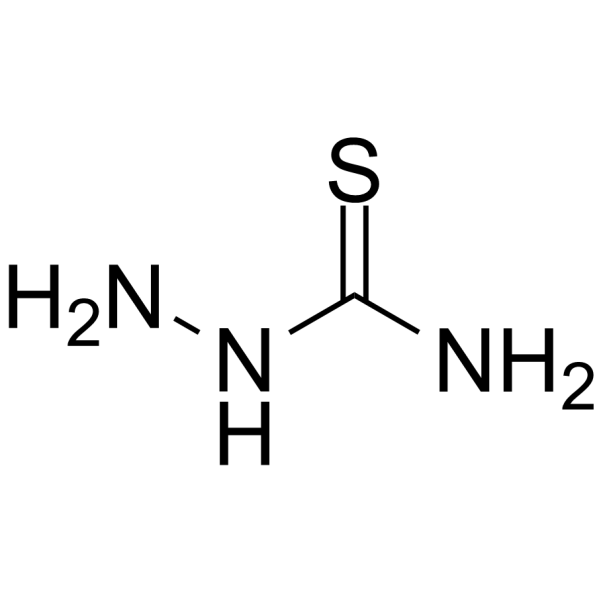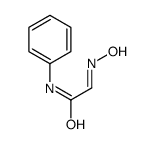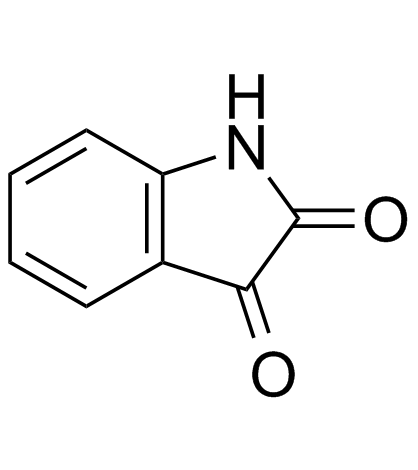1910-68-5
| 中文名 | 美替沙腙 |
|---|---|
| 英文名 | Metisazone |
| 中文别名 | 肼硫代羰酰胺,2-(1,2-二氢-1-甲基-2-氧代-3H-吲哚-3-亚基) |
| 英文别名 |
Metisazon
Viruzona Metisazonum N-methylisatin-3-thiosemicarbazone methisazone [(1-methyl-2-oxoindol-3-ylidene)amino]thiourea [(Z)-(1-methyl-2-oxoindol-3-ylidene)amino]thiourea Marboran N-Methylisatin thiosemicarbazone Kemoviran |
| 描述 | 甲硫腙(Marboran)是一种抗病毒药物,通过抑制mRNA和蛋白质合成发挥作用。甲苯胺酮也是一种SARS-CoV-2(2019冠状病毒疾病)抑制剂。甲苯胺酮主要用于痘病毒[1]。 |
|---|---|
| 相关类别 | |
| 参考文献 |
| 密度 | 1.47 g/cm3 |
|---|---|
| 沸点 | 410.3ºC at 760 mmHg |
| 熔点 | 245° |
| 分子式 | C10H10N4OS |
| 分子量 | 234.28 |
| 闪点 | 202ºC |
| 精确质量 | 234.05800 |
| PSA | 102.81000 |
| LogP | 1.35650 |
| 蒸汽压 | 6.07E-07mmHg at 25°C |
| 折射率 | 1.732 |
Synonym:Methisazon Section 2 - COMPOSITION, INFORMATION ON INGREDIENTS
Risk Phrases: Section 3 - HAZARDS IDENTIFICATION EMERGENCY OVERVIEW
Appearance: Target Organs: None. Potential Health Effects The toxicological properties of this material have not been investigated. Use appropriate procedures to prevent opportunities for direct contact with the skin or eyes and to prevent inhalation. Section 4 - FIRST AID MEASURES Eyes: Flush eyes with plenty of water for at least 15 minutes, occasionally lifting the upper and lower eyelids. Get medical aid immediately. Skin: Get medical aid. Flush skin with plenty of soap and water for at least 15 minutes while removing contaminated clothing and shoes. Remove contaminated clothing and shoes. Ingestion: If victim is conscious and alert, give 2-4 cupfuls of milk or water. Get medical aid immediately. Inhalation: Get medical aid immediately. Remove from exposure to fresh air immediately. If not breathing, give artificial respiration. If breathing is difficult, give oxygen. Notes to Physician: Treat symptomatically and supportively. Section 5 - FIRE FIGHTING MEASURES General Information: As in any fire, wear a self-contained breathing apparatus in pressure-demand, MSHA/NIOSH (approved or equivalent), and full protective gear. During a fire, irritating and highly toxic gases may be generated by thermal decomposition or combustion. Extinguishing Media: In case of fire, use water, dry chemical, chemical foam, or alcohol-resistant foam. Section 6 - ACCIDENTAL RELEASE MEASURES General Information: Use proper personal protective equipment as indicated in Section 8. Spills/Leaks: Clean up spills immediately, observing precautions in the Protective Equipment section. Sweep up, then place into a suitable container for disposal. Section 7 - HANDLING and STORAGE Handling: Wash thoroughly after handling. Remove contaminated clothing and wash before reuse. Avoid contact with eyes, skin, and clothing. Avoid ingestion and inhalation. Storage: Store in a cool, dry place. Keep container closed when not in use. Section 8 - EXPOSURE CONTROLS, PERSONAL PROTECTION Engineering Controls: Use adequate general or local exhaust ventilation to keep airborne concentrations below the permissible exposure limits. Use process enclosure, local exhaust ventilation, or other engineering controls to control airborne levels. Exposure Limits +--------------------+-------------------+-------------------+-----------------+ | Chemical Name | ACGIH | NIOSH |OSHA - Final PELs| |--------------------|-------------------|-------------------|-----------------| | N-Methylisatin 3-(t|none listed |none listed |none listed | | hiosemicarbazone), | | | | | 96% | | | | +--------------------+-------------------+-------------------+-----------------+ OSHA Vacated PELs: N-Methylisatin 3-(thiosemicarbazone), 96%: No OSHA Vacated PELs are listed for this chemical. Personal Protective Equipment Eyes: Wear safety glasses and chemical goggles if splashing is possible. Skin: Wear appropriate protective gloves and clothing to prevent skin exposure. Clothing: Wear appropriate protective clothing to minimize contact with skin. Respirators: Wear a NIOSH/MSHA or European Standard EN 149 approved full-facepiece airline respirator in the positive pressure mode with emergency escape provisions. Section 9 - PHYSICAL AND CHEMICAL PROPERTIES Physical State: Not available. Appearance: not available Odor: None reported. pH: Not available. Vapor Pressure: Not available. Viscosity: Not available. Boiling Point: @ 760.00mm Hg Freezing/Melting Point: 235 deg C Autoignition Temperature: Not available. Flash Point: Not available. NFPA Rating: Not published. Explosion Limits, Lower: Not available. Upper: Not available. Decomposition Temperature: Solubility: Specific Gravity/Density: Molecular Formula: C10H10N4OS Molecular Weight: 234.28 Section 10 - STABILITY AND REACTIVITY Chemical Stability: Stable under normal temperatures and pressures. Conditions to Avoid: Incompatible materials, strong oxidants. Incompatibilities with Other Materials: Not available. Hazardous Decomposition Products: Nitrogen oxides, carbon monoxide, oxides of sulfur, irritating and toxic fumes and gases, carbon dioxide, nitrogen. Hazardous Polymerization: Has not been reported. Section 11 - TOXICOLOGICAL INFORMATION RTECS#: CAS# 1910-68-5: NL7960000 LD50/LC50: CAS# 1910-68-5: Oral, mouse: LD50 = 4 gm/kg. Carcinogenicity: N-Methylisatin 3-(thiosemicarbazone), 96% - Not listed by ACGIH, IARC, NIOSH, NTP, or OSHA. See actual entry in RTECS for complete information. Section 12 - ECOLOGICAL INFORMATION Section 13 - DISPOSAL CONSIDERATIONS Chemical waste generators must determine whether a discarded chemical is classif as a hazardous waste. US EPA guidelines for the classification determination are listed in 40 CFR Part Additionally, waste generators must consult state and local hazardous waste regu ensure complete and accurate classification. RCRA P-Series: None listed. RCRA U-Series: None listed. Section 14 - TRANSPORT INFORMATION CDG/CPL Not classified as hazardous for supply. Canadian TDG No information available. Section 15 - REGULATORY INFORMATION European/International Regulations European Labeling in Accordance with EC Directives Hazard Symbols: Not available. Risk Phrases: Safety Phrases: S 24/25 Avoid contact with skin and eyes. WGK (Water Danger/Protection) CAS# 1910-68-5: No information available. United Kingdom Occupational Exposure Limits Canada None of the chemicals in this product are listed on the DSL/NDSL list. WHMIS: Not available. CAS# 1910-68-5 is not listed on Canada's Ingredient Disclosure List. Exposure Limits US FEDERAL TSCA CAS# 1910-68-5 is not listed on the TSCA inventory. It is for research and development use only. Health & Safety Reporting List None of the chemicals are on the Health & Safety Reporting List. Chemical Test Rules None of the chemicals in this product are under a Chemical Test Rule. Section 12b None of the chemicals are listed under TSCA Section 12b. TSCA Significant New Use Rule None of the chemicals in this material have a SNUR under TSCA. SARA Section 302 (RQ) None of the chemicals in this material have an RQ. Section 302 (TPQ) None of the chemicals in this product have a TPQ. Section 313 No chemicals are reportable under Section 313. Clean Air Act: This material does not contain any hazardous air pollutants. This material does not contain any Class 1 Ozone depletors. SECTION 16 - ADDITIONAL INFORMATION N/A |
CHEMICAL IDENTIFICATION
HEALTH HAZARD DATAACUTE TOXICITY DATA
MUTATION DATA
|
| 海关编码 | 2933790090 |
|---|
| 上游产品 4 | |
|---|---|
| 下游产品 0 | |
| 海关编码 | 2933790090 |
|---|---|
| 中文概述 | 2933790090 其他内酰胺. 增值税率:17.0% 退税率:9.0% 监管条件:无 最惠国关税:9.0% 普通关税:20.0% |
| 申报要素 | 品名, 成分含量, 用途, 乌洛托品请注明外观, 6-己内酰胺请注明外观, 签约日期 |
| Summary | 2933790090. other lactams. VAT:17.0%. Tax rebate rate:9.0%. . MFN tariff:9.0%. General tariff:20.0% |






